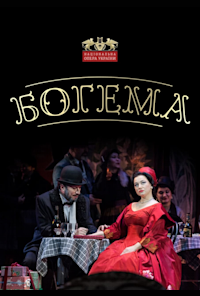Giacomo Puccini (December 22, 1858 - November 29, 1924) was an Italian composer, one of the most prominent representatives of verism, who significantly enriched the genre diversity of the musical performing arts of the late nineteenth and early nineteenth centuries. XX century
If there was such a hypothetical rating of the success of operas created over the last five centuries, Puccini's "Bohemia" would occupy one of the top positions. Now it is impossible to count at least approximately how many productions of this work took place even on the world's leading opera stages, not to mention those that existed in many Italian, French, English, Polish, Russian, Austrian provincial cities. It was from Puchchin's "Bohemia" that the stellar biographies of many prominent vocalists began.
The world premiere of this work, so warm and tender to the feelings of its heroes, took place on the stage of the Teatro Regio di Torino on February 1, 1896 under the direction of twenty-eight-year-old Arturo Toscanini, already a well-known maestro, brilliant interpreter Wagner.
Despite the very high marks of Puccini's new work by his entourage - musicians and music critics close to the Ricordi publishing house - Bohemia suffered the same annoyance as most operas of composers of the second half of the nineteenth century. And although the opera was not "whistled", but the Turin audience received it quite coolly, which surprised and upset the composer, who did not doubt the success of his new work.
The audience was disappointed by the plot of the opera. According to ground music lovers, the plot was very different from the reference standards of the genre, which was based on Shakespeare's passions and no longer authentic texts of German and French historical chronicles. Therefore, fans of the opera could not accept such a mundane, in their opinion, the plot, which formed the basis of the opera "Bohemia".
It is worth mentioning that the repertoire of the National Opera of Ukraine now includes almost all of Puccini's famous operas ("Madame Butterfly", "Floria Tosca", "Manon Lescaut", "Turandot", "Gianni Schicchi"). As a brilliant melodist and instrumentalist, he organically embodied in his scores the neo-romantic principles of instrumentation and construction of musical drama of contemporary European symphony.
In 1891, librettists Luigi Illic and Giuseppe Giacosa drew Giuseppe Puccini's attention to the French poet Henri Murger's novel Scenes from the Life of Bohemia, read by European youth of the time, and offered his libretto based on the novel's novel for a new opera. The work was about talented but poor artists - poets, artists, journalists, actors who lived in the cold and uncomfortable attics of Paris' Latin Quarter.
The composer liked the libretto. This deeply realistic work was about what Puccini himself experienced in his youth. Starting from the plot of A. Murger's novel, G. Puccini enriched the content of the work with many interesting and very eloquent plot lines, expressive clarifications. The author sought to reinterpret, first of all, the everyday moments of the romantic story about the difficult life of the heroes. He selects the most typical for the spirit of the bohemian environment and with renewed vigor reveals the hidden acute conflict - the creative youth and the commoner. This is what makes the opera "Bohemia" always modern and relevant.
The opera libretto has changed significantly in relation to A. Murger's novel in the ratio of comedy and lyric line, at the same time the composer reveals the tragedy of human destiny. The composer, brilliantly mastering the material of life, subordinated his musical drama, first of all, to logic, dressing prosaic events in wonderful feelings of sincerity and love, colored by a passionate desire to find their place in this complex world dominated by bourgeois moral principles, customs and traditions. which have no place for sincerity of feelings, purity of relations. The heroes of "Bohemia" are able to sacrifice, suffer, enjoy the sun and life. Perhaps, not only with beautiful music, but also with the moral and ethical principles embedded in the work, the opera remains in the context of changing times and at the forefront of moral tests for humanity.
The music of "Bohemia", like all other operas by G. Puccini, is filled with sincere warmth. The composer worked on the score for eight months, more and more concerned about the fate of the heroes of his future opera, who, despite all the vicissitudes of poverty, lived with bright dreams and hopes. They were not afraid of cold or hunger, and worried only one thing - to find their place in the great and turbulent world of creative bohemia. They were the children of their time and the relationships that then developed in the society they challenged. It should be noted that the heroes of the opera "Bohemia" had their prototypes, they seemed to come straight from the streets of Paris on the stage.
According to the biographer G. Puccini A. Fraccarol, the composer fell in love with his heroines - Mimi, Mussetta. In these tender and subtle images of youth and love, he found a source of inspiration. Concluding the opera, he openly wrote in one of his letters to Giulio Ricordi: "I cried like a child." We can say that it was in this opera that the personal destiny of the famous composer was reflected.
Even after learning that his comrade R. Leoncavallo was already writing an opera based on A. Murge's novel, he did not abandon the idea, on the contrary, he was imbued with the spirit of competition. And in the end, time has shown that Ruggiero Leoncavallo's "Bohemia" became one of the many works of his time, and Giacomo Puccini's "Bohemia" - a timeless phenomenon of the world cultural space.
Some of the venerable critics of the time, despite the rather high creative reputation of G. Puccini, who already had in his work the opera "Manon Lescaut" successfully staged at the same Reggio Theater, not only did not accept the new work, but called it "empty, banal. , infantile, down to earth. Surprisingly, theaters competed to include in the repertoire of "Bohemia" by G. Puccini, despite the rather negative criticism of the opera. Much has been done in the musical environment to make this work appreciated by the famous European publisher, musicologist and musical theater actor Giulio Ricordi and Giacomo Puccini's best friend and admirer, conductor Arturo Toscanini, who never doubted the genius of Boge's opera.
Contributed to the growing popularity of Puccini's work and its premiere in Paris (1898, Opera Comic), Vienna (1903, directed by G. Mahler), through which, and especially after the triumphant success at the Brescia Theater opera "Madame Butterfly" with the most famous Ukrainian singer Solomiya Krushelnytska (May 28, 1904), it became obvious that European musical culture received a real successor to Giuseppe Verdi. And he became none other than Giacomo Puccini.
World premieres followed one after another: Tosca (Roman Opera, 1900), Madame Butterfly (La Scala, 1904), The Girl from the West (New York, 1910), and Swallow (Monte Carlo). , 1917), triptych one-act operas "Cloak", "Sister Angelica", "Gianni Schicchi". In 1921, the composer began writing his last opera, Turandot, work on which ended on December 29, 1924, his death.
G. Puccini's "Bohemia" was first staged in Kyiv in 1904 (conductor E. Cooper, director J. Helrot), and in 1913 conductor L. Steinberg and director O. Ulukhanov interpreted it.
The next production was in 1958 (conductor - J. Karasyk, director - I. Molostov, artists - M. Iriskin and A. Kholoptsev).
In 1969 the play was renewed (conductor - V. Kortazzi, and in 1970 - O. Ryabov).
In 1986 a new production of "Bohemia" took place (conductor - R. Dorozhivsky, director - D. Smolych, artist - A. Kholoptsev).
In 1998, the theater again turned to the opera by G. Puccini (conductor - M. Dyadyura, director - M. Tretyak, choirmaster - L. Venediktov, A. Kholoptsev's scenery was renewed by S. Petrovsky, costumes - N. Kucherya).
In the new production of the opera "Bohemia", according to the directors of the play (conductor - M. Dyadyura, director - I. Nunciata, choirmaster - B. Plish, scenography and costumes - M. Levitskaya), the heroes of the opera will be in a slightly different time dimension. Their environment will be the second half of the twentieth century, which seems to bring modern viewers closer to Puchchin's heroes.
In different years, the main parts in the Kyiv interpretations of "Bohemia" were performed by: T. Ponomarenko, G. Sholina, K. Radchenko, G. Tsypola, L. Zabilasta, I. Dats, O. Nagorna, I. Semenenko (Mimi); V. Timokhin, A. Solovyanenko, O. Vostryakov, V. Fedotov, V. Grishko (Rudolf); E. Chavdar, E. Miroshnychenko, M. Stefyuk, L. Semenenko, V. Stepova, (Musetta); M. Vorvulev, B. Puzin, A. Mokrenko, R. Mayboroda, M. Koval, P. Priymak, V. Bazir (Marseille); M. Shostak, O. Zagrebelny, V. Manolov, V. Lupalov (Shonar); V. Pazic, V. Pivovarov, B. Gnid, M. Shopsha, B. Taras, Y. Khomich (Kollen); V. Gerasimchuk, V. Lositsky, G. Krasulya (Benoit); O. Chulyuk-Zagray, S. Skubak, S. Matveev (Alcindor); T. Feoktistov, M. Khoruzhiy. M. Shulyak, Y. Khomich (Parpinol).


